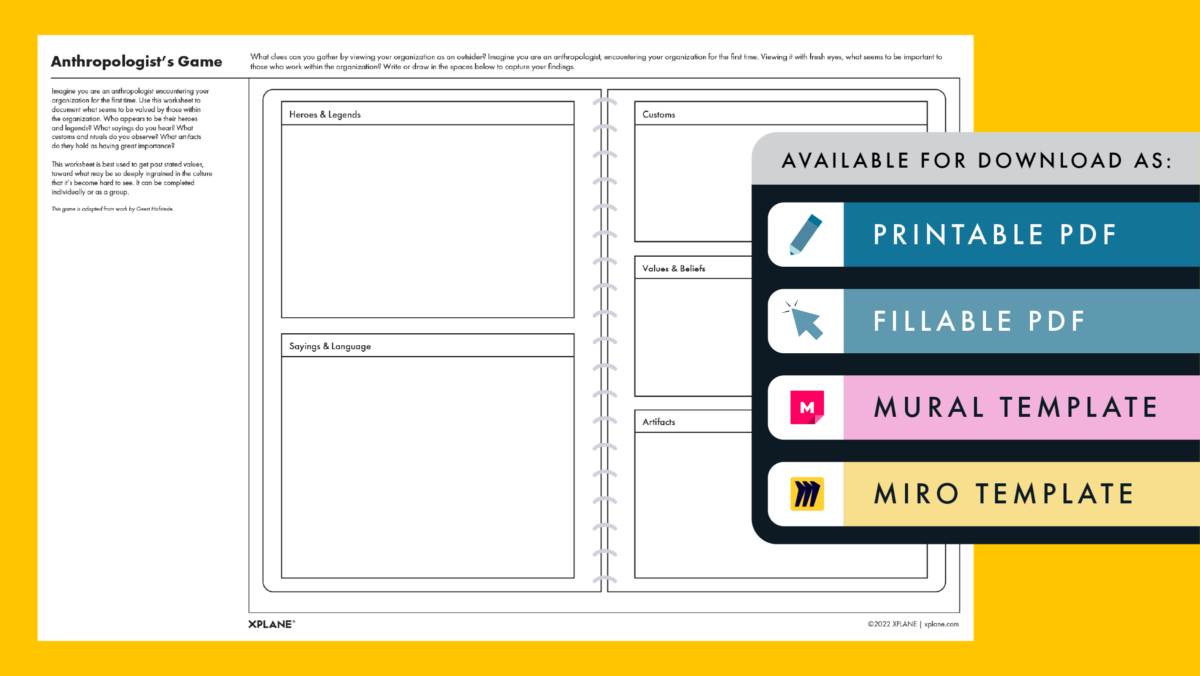This blog post was last updated on February 6, 2024.
Can you define how your culture drives your success? Do you know the recipe for making culture your secret sauce? Get the culture you want by getting clear on what it looks like.
Leadership and culture are inextricably linked. According to Glassdoor, “companies with the best cultures consistently outperformed competitors and their average market by up to 115.6%.” Culture not only impacts employee satisfaction and retention, it also plays a major role in brand image and bottom-line performance. As a leader, driving results includes enabling and growing a culture that builds collaboration, achievement, and goodwill.
Yet culture can feel intangible and hard to pinpoint, let alone move from ideation to action. Intentionally growing a culture that supports your organization’s success is always important, but especially so if:
- Market fluctuations and employee engagement are creating risk to maintaining and attracting top talent
- You have an awesome culture, but growth, scaling, or other changes are creating doubt about maintaining that magic
- You’re facing culture clash, culture erosion, or culture confusion
- Your employees describe or define your culture in inconsistent (or nonexistent) ways
- You have an opportunity to make culture your competitive advantage
The first step to getting the culture you want is getting clear on what it looks like. But it’s tricky to put your finger on culture. What’s the secret to making the intangible tangible? How can you move beyond a linguistic exercise of nice-sounding words to identify key levers that will drive value for your specific organization?
Using visuals and games gets beyond the superficial and generic to what’s uniquely true about your organization. Inspired by Gamestorming, below are six games XPLANE plays with groups who want to shape company culture and map their current or desired culture.
These games are serious play: while having fun in a group, they create a space that gives your team permission to have fun and express ideas and concerns without fear of negative consequences. They open challenging conversations and can get to the heart of a slippery topic. This technique is just part of XPLANE’s approach to culture mapping.
Rather than culture work focusing on prioritizing a list of feel-good words, you can use games to drive meaningful conversation and quickly uncover insights. Building from there, XPLANE can help you create a culture activation plan or build custom engagement tools to help align your organization around your shared values, mindsets, and behaviors.
We’re here to help you make culture change insightful, fun, and impactful!
Anthropologist’s Game
Best for: Getting past stated values to what may be so deeply ingrained in the culture that it’s become hard to see. This game is adapted from work by Geert Hofstede.
How to Play: Individual or group activity. Ask yourself, “What clues can I gather by looking at my organization as an outsider?” Imagine you are an anthropologist encountering your organization in the wild for the first time. Use the worksheet to document what seems to be particular to the people in this organization. Who appear to be their heroes and legends? What sayings do you hear? What customs and rituals do you observe? What artifacts do they hold as having great importance?
Mascot Game
Best for: Getting clear about the culture your organization aspires to without relying on vague, cliché words.
How to Play: Best as a group activity. Ask your team, “What celebrity or notable person would be our organization’s “culture mascot”—a spokesperson for our cultural values”? Then ask “Why?” What traits make them emblematic of our culture? Sketch the celebrity in the center and fill out the diagram with the top six characteristics.
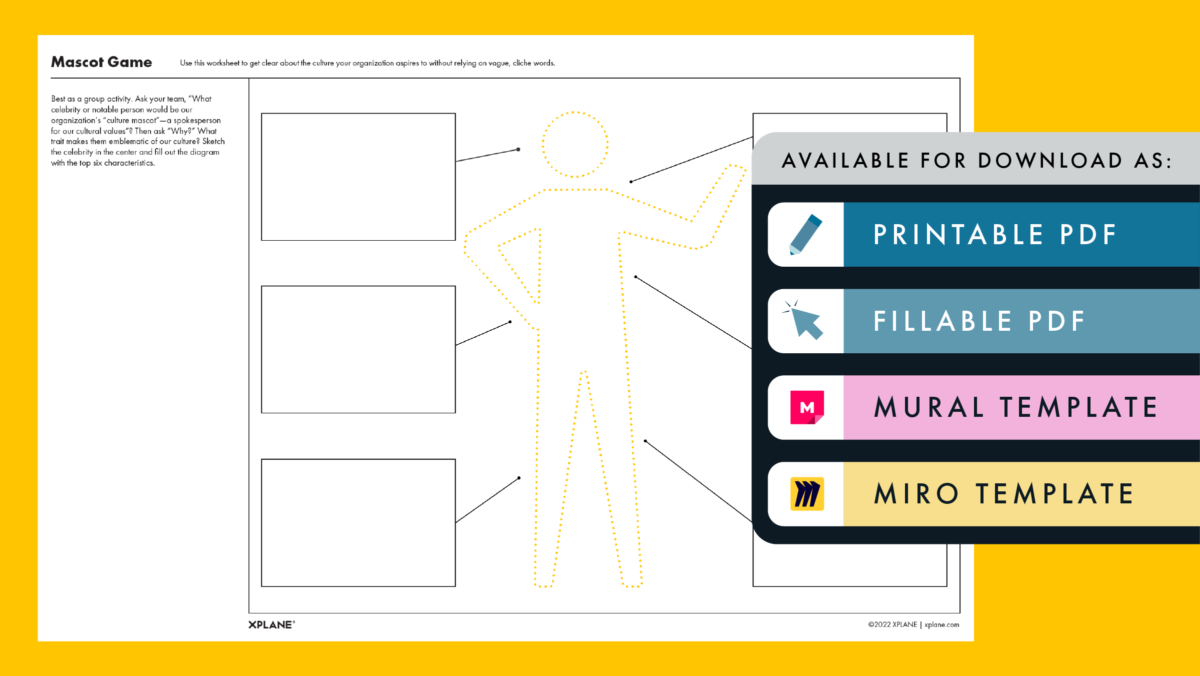
Culture Crush Game
Best for: Clarifying specific elements of the culture you aspire to by looking not just at desirable cultures but also undesirable cultures. Remember the mantra: contrast creates definition!
How to Play: Best as a group activity. Ask your team, “On what organizations do we have a culture crush?” Think about companies that people often talk about emulating. List them in the hearts on the worksheet. Then note the reasons why you have a crush on them. Next, think about what organizations are the antitheses of the culture you want. Fill in the drops on the worksheet and note why for each.
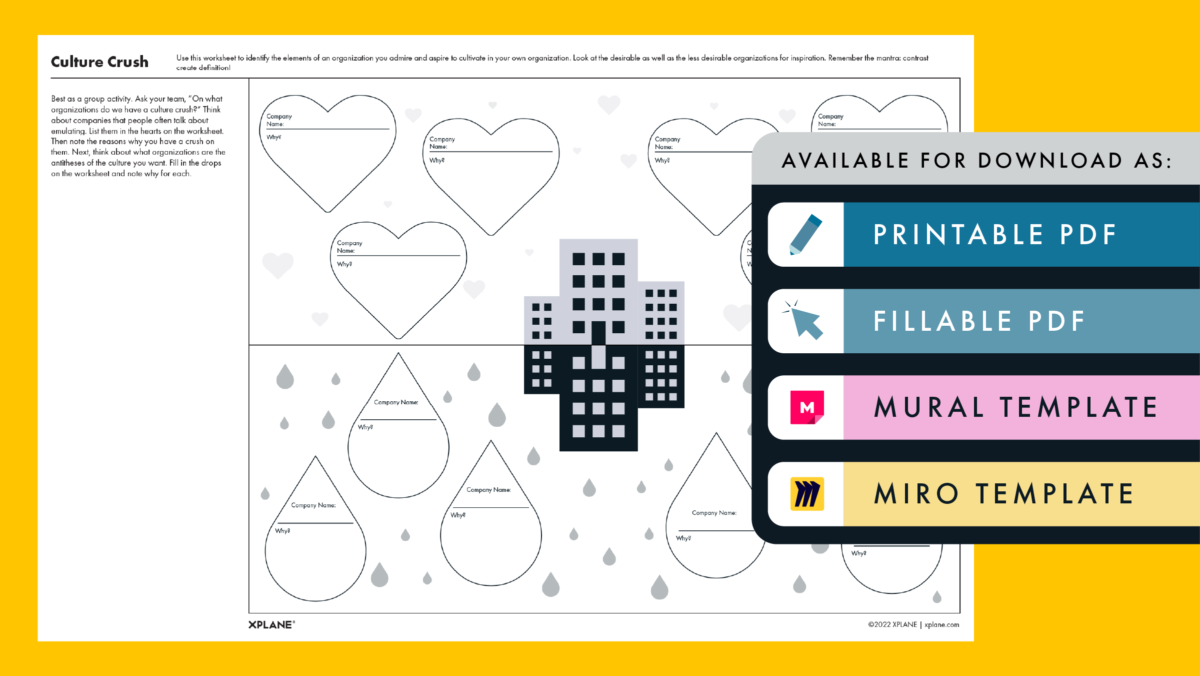
Tightrope Game
Best for: Complex cultures that could be described as “nuanced,” “hard to navigate,” “requires experience to learn,” or “seemingly full of contradictions.” Organizational values are rarely absolute—they are usually balanced by an opposite value. One way to visualize culture is to name the values in tension and the desired balance.
How to Play: Individual or group activity. Identify the values that are in tension in your organization and draw them in opposite boxes on the worksheet. Think about the people in your organization who are very successful and mark where they fall on the balance between these opposing values. Use the worksheet to identify the balance between competing values. For example, where does your organization stand between “experimentation” and “execution,” “regional differences are respected” and “one firm mentality,” or “humble” and “confident”?
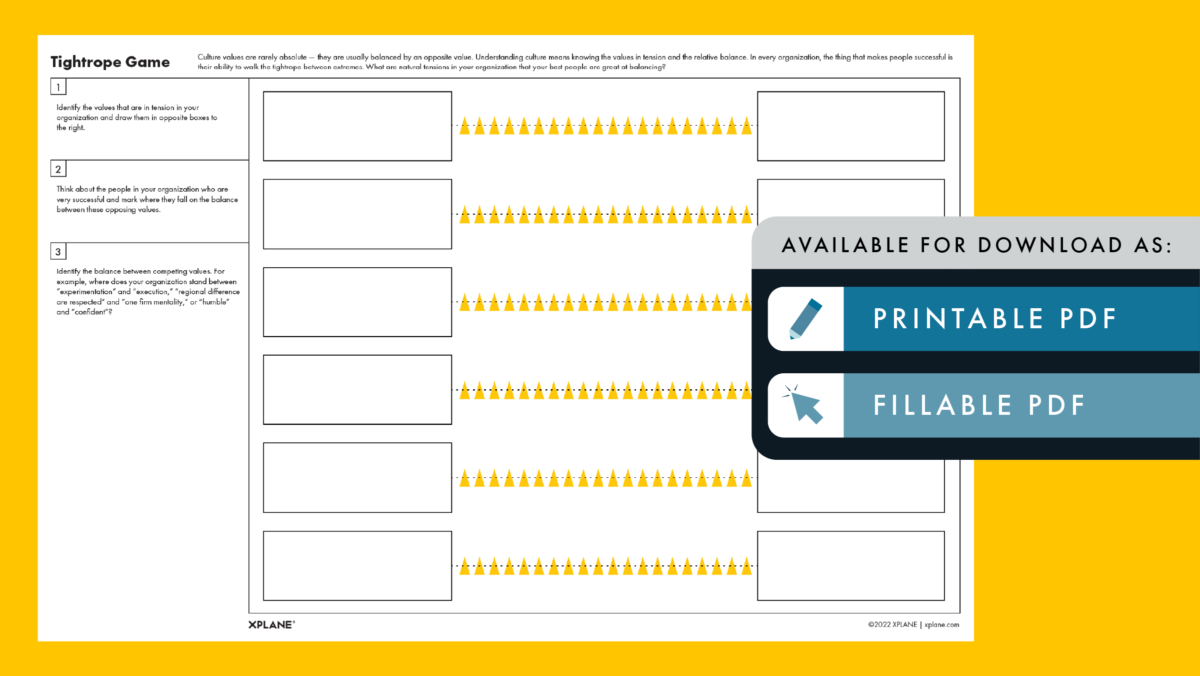
Star Employee Game
Best for: Getting out of the abstract to real people’s behaviors that are working in your current culture.
How to Play: Individual or group activity. Ask yourself, “Who are the culture stars of our organization?” Ask around–if you could nominate one person to represent the company culture, who would it be? Pick your biggest culture star and use the worksheet to diagram the behaviors they exhibit.
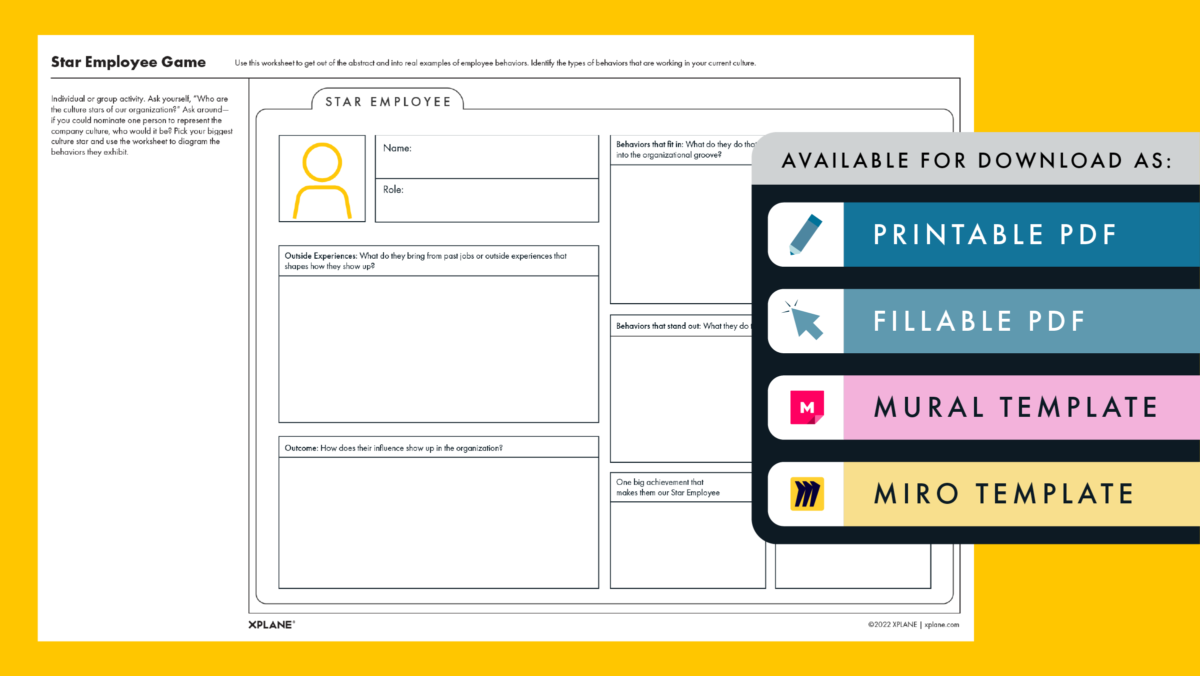
Culture MadLibs Game
Best for: Getting specific about the nuances that make your current culture unique.
How to Play: Find a partner or small team and fill out the “MadLibs” style story in the worksheet. You may find it’s easier to read the story in context rather than blindly choosing adjectives and nouns like in the real MadLibs game–although that approach certainly makes things humorous!
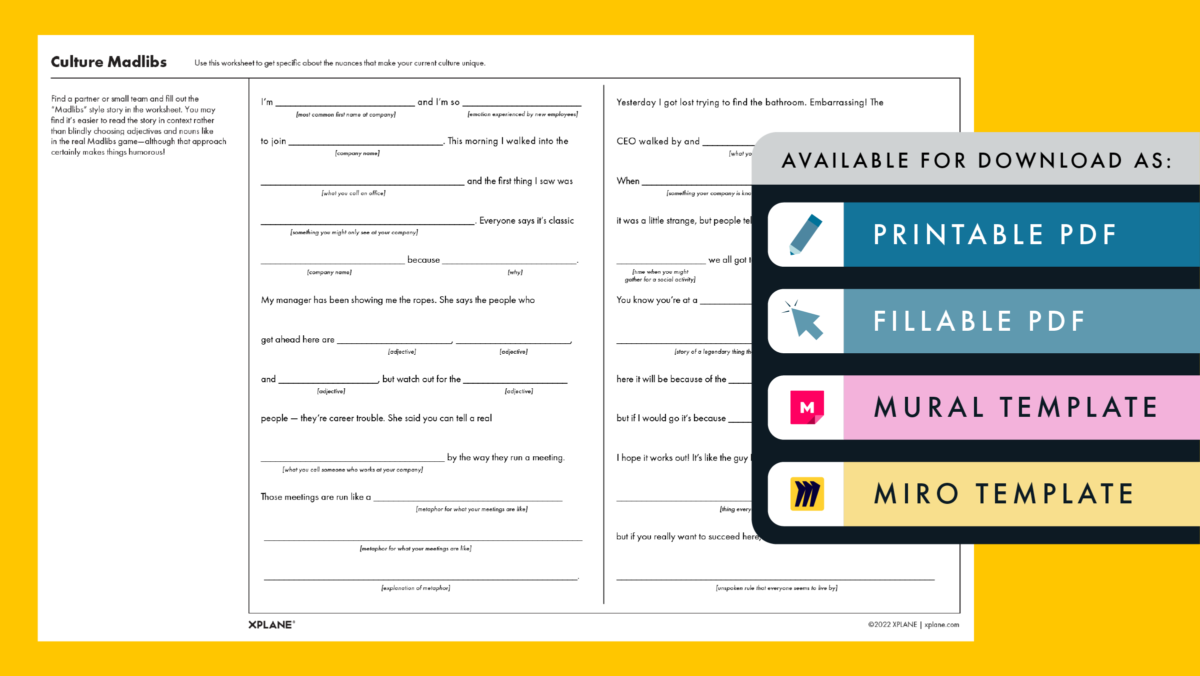

Are your employees resistant to change?
Use these games to start tackling your organization’s culture challenges. We’d love to hear how they’re working for you — or to partner with you in designing a custom approach that will help accelerate change. Get in touch today to talk about how an XPLANE-led Culture Mapping Workshop could help you enrich your organization’s culture.

